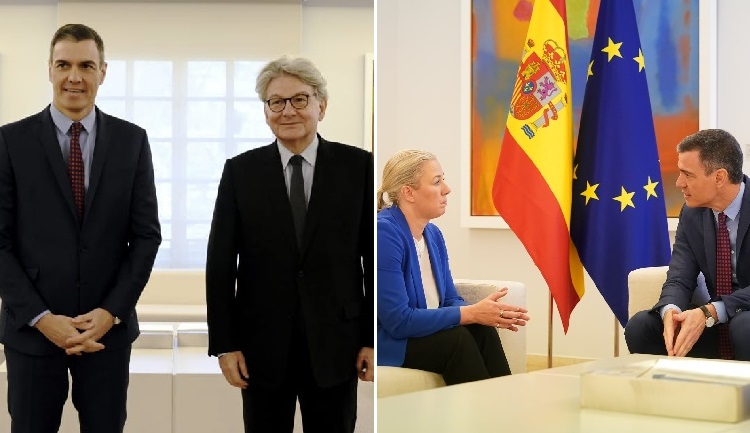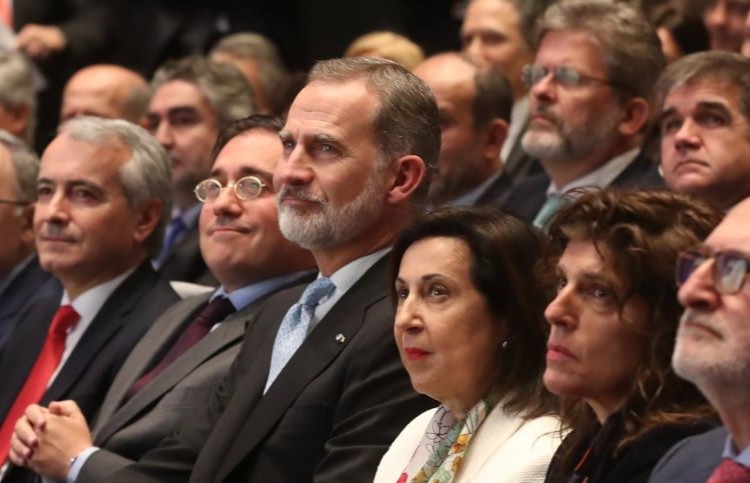The Diplomat
The European Commissioners for the Internal Market, Thierry Breton, and International Associations, Jutta Urpilainen, completed yesterday an intense working visit in Madrid, where they discussed with the President of the Government, Pedro Sánchez, and other members of the Executive the major challenges of the upcoming Spanish Presidency of the Council of the EU, which will take place in the second half of this year.
Pedro Sánchez received both commissioners separately at the Moncloa Complex (first Breton and then Urpilainen). During the meeting, according to Moncloa, the head of the Executive informed them that “economic recovery, energy security and strategic autonomy will be priorities of the Spanish Presidency of the EU” and told them that “only through unity will we be able to face the great challenges”.
“Excellent working session in Madrid with President Pedro Sánchez,” declared Thierry Breton via Twitter. During the meeting, he specified, the main issues of the upcoming extraordinary European Council in early February were addressed, such as clean technologies, the adaptation of state aid, the acceleration of European projects of common interest or the need to complement the Next Generation EU recovery fund with European financing solutions. “We will preserve EU industry and the single market,” he assured.
For her part, Commissioner Urpilainen also reported on her meeting with Sánchez, in which they analyzed “the priorities of the Spanish Presidency of the Council, in particular the EU-CELAC Summit”, and exchanged views on geopolitics, global competition and European leadership in the social, green and digital agendas.
Subsequently, the two commissioners were received by the Minister of Foreign Affairs, José Manuel Albares. During the meeting with Jutta Urpilainen, the head of Spanish diplomacy reiterated to her “Spain’s commitment” to the Global Gateway (the new European strategy to boost the digital, energy and transport sectors and strengthen health, education and research systems worldwide) and Team Europe initiatives, as well as “to the strengthening of EU-Latin American relations during our EU Presidency,” as the minister reported via Twitter. “Spain is participating in almost all Team Europe initiatives in Latin America and the Caribbean,” the commissioner said. “We discussed how to get others as engaged as we are and took stock of the preparations for the Summit,” Jutta Urpilainen added.
“Good meeting with Internal Market Commissioner Thierry Breton,” Albares later reported via the same social network. “We discussed Europe’s place in the world, energy security, the European defense industry and the upcoming Spanish EU Presidency,” he added. “In 2023, to influence the new balance of power that is emerging, Europe will have to show solidarity, unity and leadership,” Breton said, for his part, after his “enriching” meeting with Albares. “We are working together in the EU for it,” he added.
The rest of Breton and Urpilainen’s agenda
Thierry Breton also visited Iberdrola‘s Innovation and Training Campus in Madrid, where he met with the company’s CEO, Ignacio Sánchez Galán, and declared that “we will need all sources of decarbonized energy to guarantee our green transition and become the first ‘electric continent’ in the world”.
He also spoke at a briefing organized by New Economy Forum in Madrid, where he stated that, despite the fact that nuclear energy is a “controversial” issue in Spain, by 2050, 20% of European production will need to be of nuclear origin.
In this same meeting, the Commissioner stated that “2023 may not be as bad as some are predicting” in terms of the economic situation, and assured that Spain “has not done badly at all, given the circumstances”, which has resulted in “quite impressive” economic growth and lower inflation than other EU countries. “Spain is one of the countries that are at the head of the European Union” in terms of the macroeconomic situation, he assured. He also confirmed that one of the objectives of his visit to Madrid was to prepare the Spanish Presidency of the European Union to be “very successful”.
Breton was received the day before by the First Vice-President and Minister of Economic Affairs and Digital Transformation, Nadia Calviño, who during the press conference that followed announced that Spain has asked the European Commission to “speed up” the procedures for State aid granted through the Next Generation EU funds. In response to these statements by his “friend” Calviño, the Commissioner said yesterday that “sometimes things in the palace go slowly”. The Commissioner was also received on Monday by the Vice President and Minister of Ecological Transition and Demographic Challenge, Teresa Ribera; the Minister of Defense, Margarita Robles; the Minister of Science and Innovation, Diana Morant; and the Minister of Industry, Trade and Tourism, Reyes Maroto.
For her part, Jutta Urpilainen was also received yesterday by Nadia Calviño, with whom she discussed “the fight against inequalities” in the framework of “the EU-Latin America and the Caribbean partnership” and “the tools we can mobilize to implement Global Gateway and engage companies”. She also participated in the second day of the VII Conference of Ambassadors, held at the Foreign Affairs headquarters in Marqués de Salamanca, where she warned that, although the “ties between the EU and Latin America and the Caribbean are strong, we cannot take the partnership” between the two regions for granted. For this reason, she declared, at the EU-CELAC Summit, scheduled during the Spanish Presidency, “we must take a step forward with a credible investment plan”.







